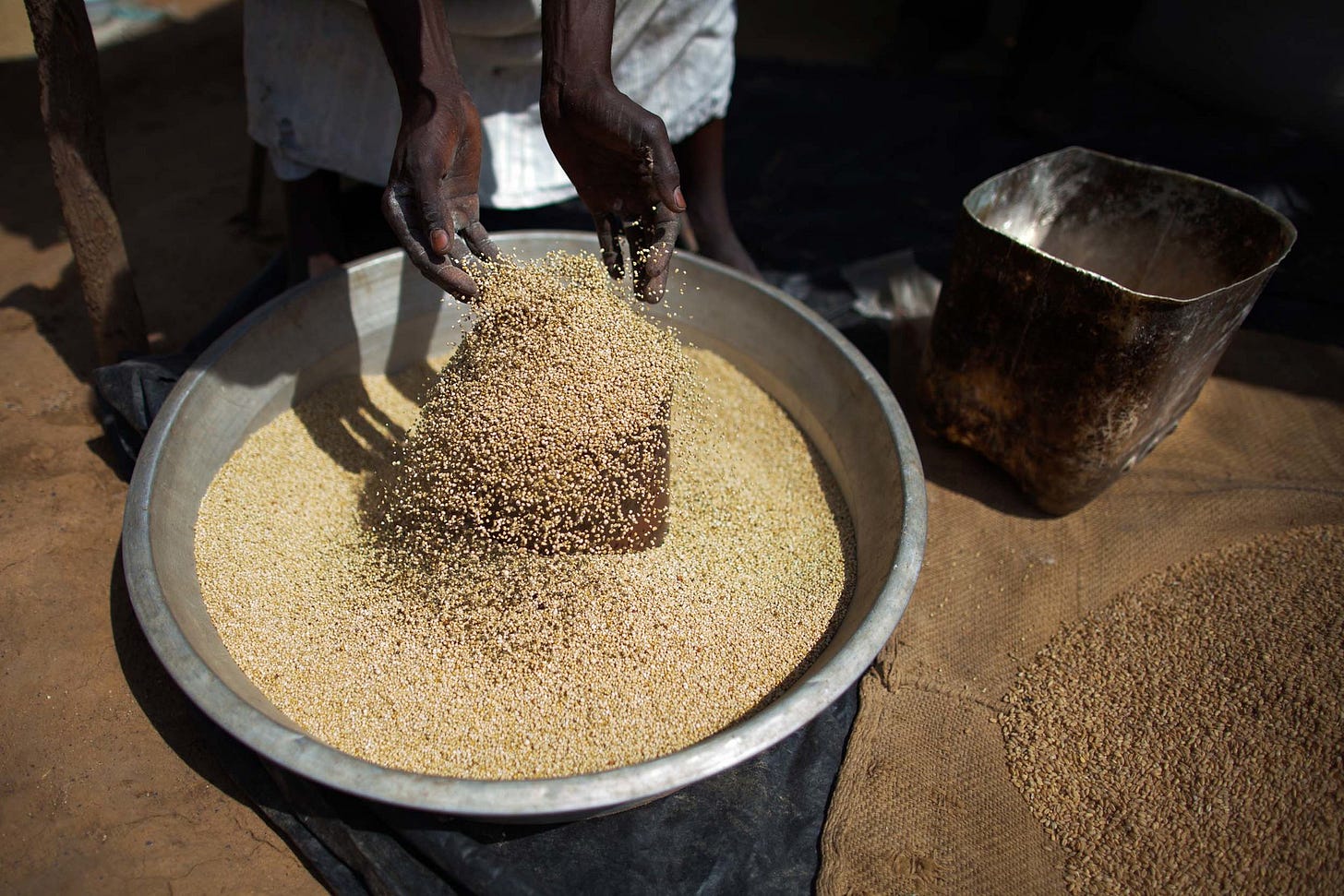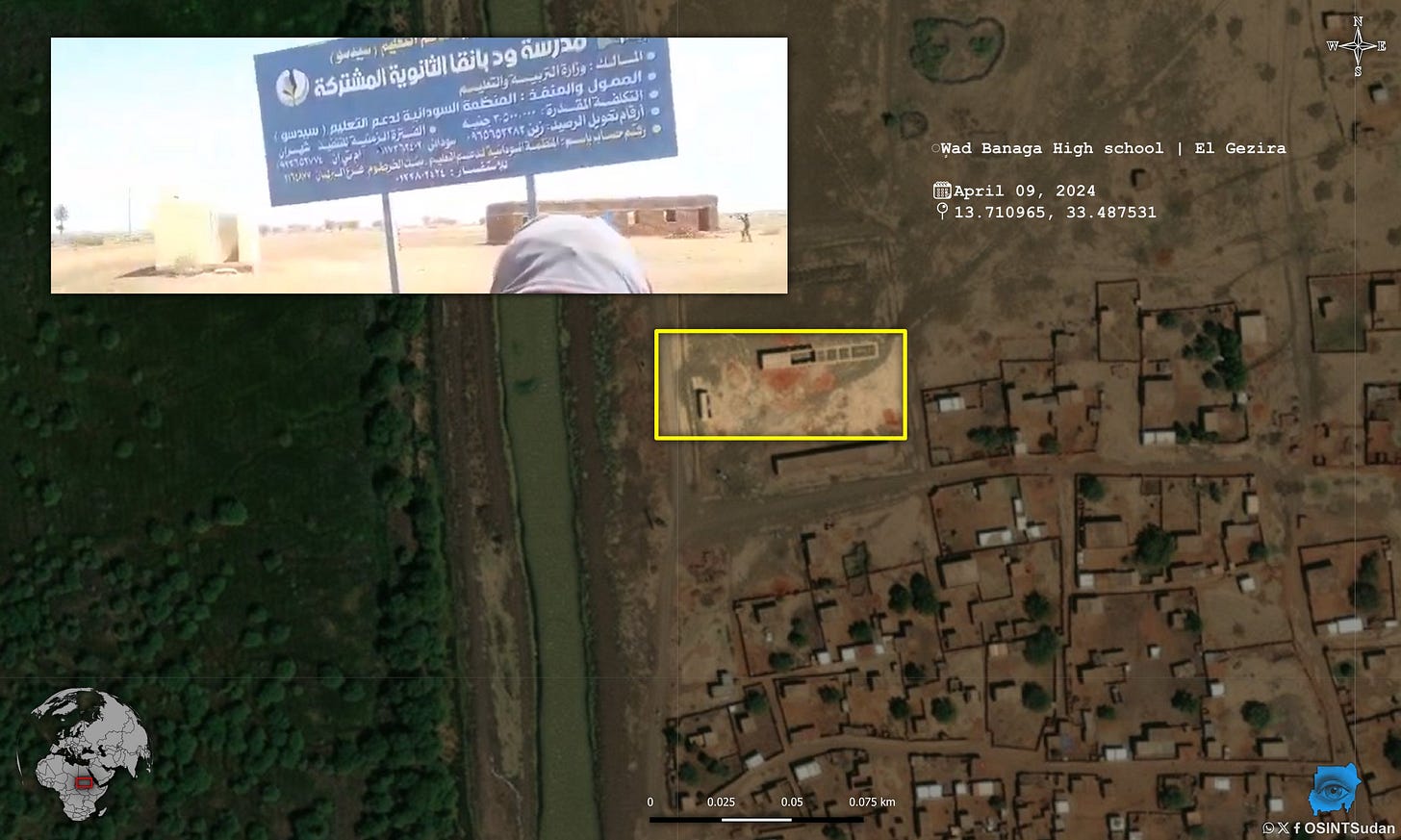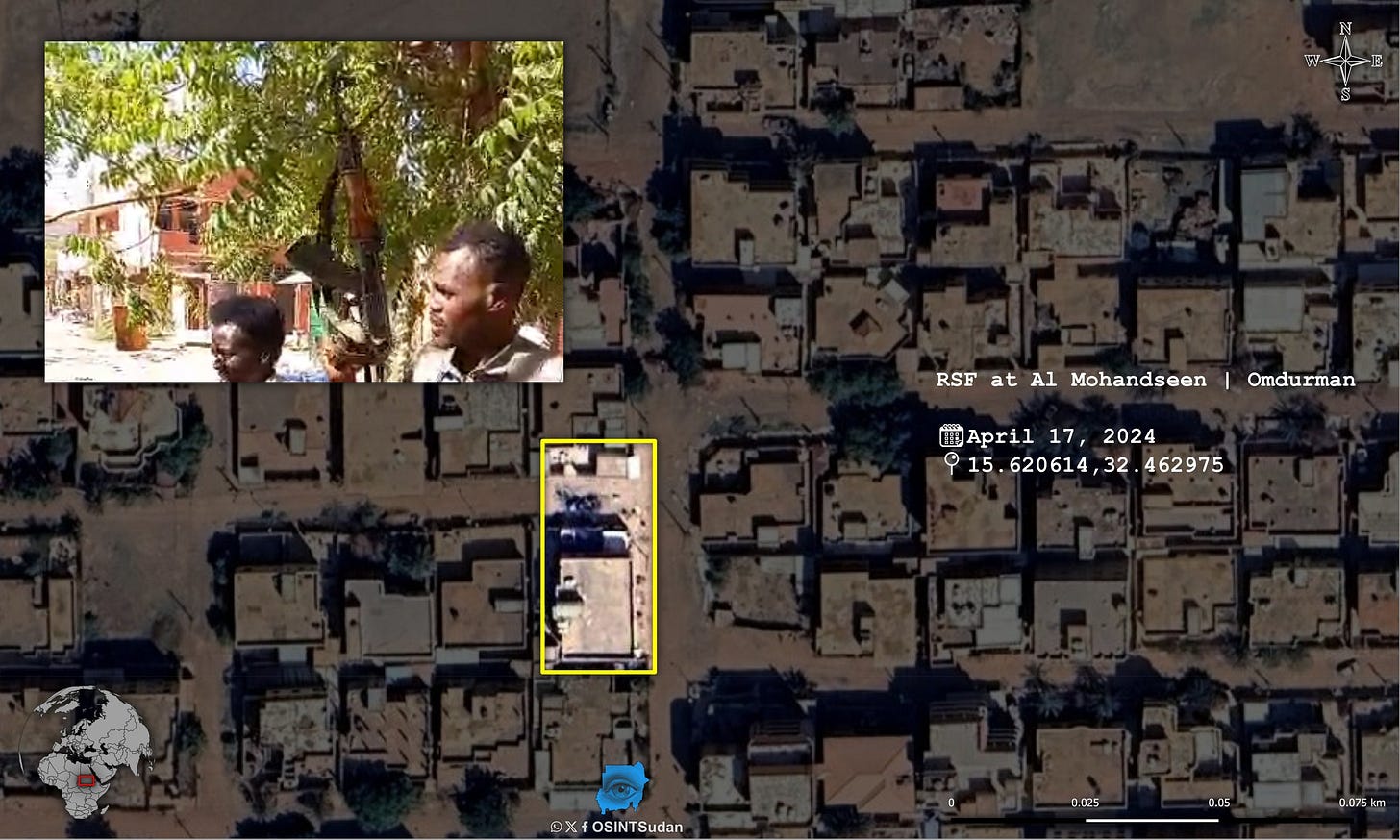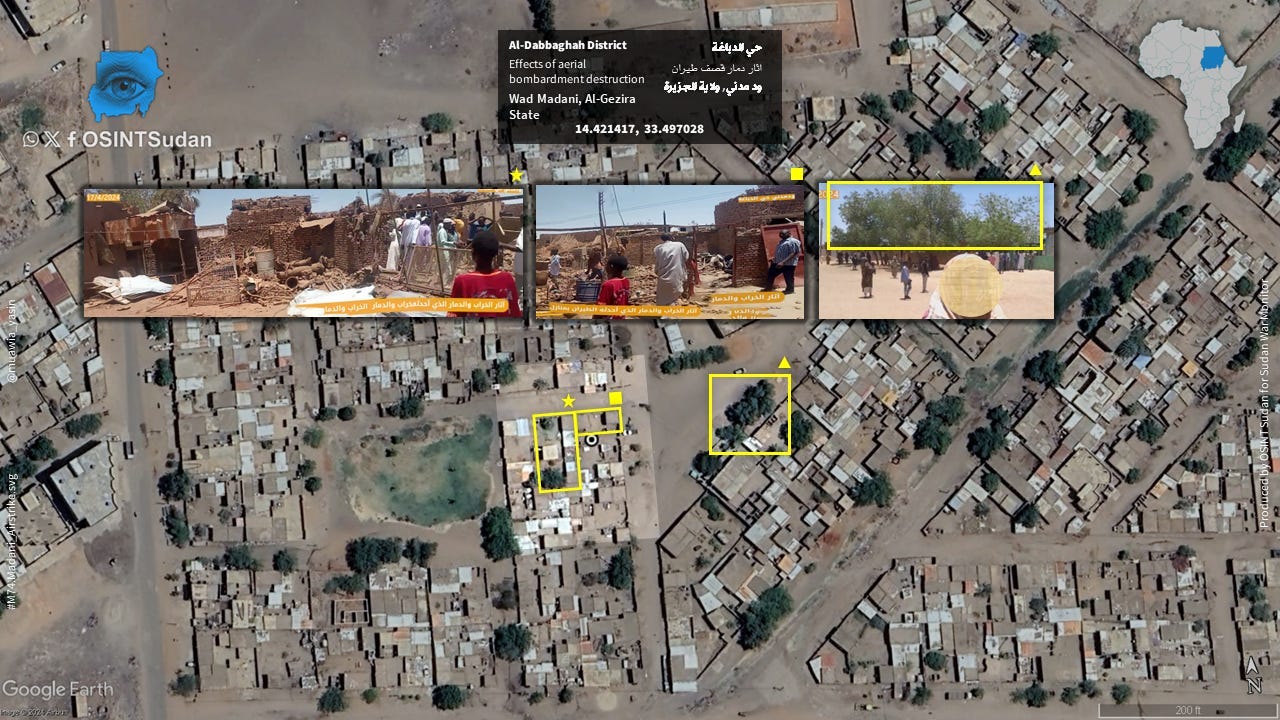Food prices spike following fresh Darfur fighting
Plus: OSINT updates from across Sudan
Fighting has continued in Sudan ahead of an emergency meeting of the UN Security Council on Friday, convened at the request of the British mission in New York.
The meeting is expected to draw attention to recent attacks on villages in North Darfur, which recall the atrocities committed in the region 20 years ago.
Abdul Rahman, a resident of a village west of El Fasher who was displaced to the Zamzam Camp as a result of the attacks, told Sudan War Monitor that a Rapid Support force mounted on about 50 military vehicles and 100 motorcycles, and others on camels, attacked the villages starting last Friday.
He said they killed about 15 people in his home area of Asbania: "They burned my house and all my possessions, and I only carried my sons and we fled towards El Fasher because the killing and targeting were random."
Abdul Rahman added that the attackers burned homes, destroyed water wells, and took food supplies, and also looted all the villagers’ money, noting that the gunmen even set fire to a local school for memorizing the Qur’an.
Major combat in Darfur ended in October last year after the fall of several major army garrisons, but resumed recently around El Fasher, home of the only remaining big army base and a stronghold of the allied JEM and SLM-MM factions.
The prices of basic commodities jumped in most of the Darfur region’s five states in of the wake of the latest fighting, which took place in El Fasher, Melit, and rural areas.
A sack of sugar in North Darfur State jumped from 92,000 to 100,000 pounds, a sack of oil from 35,000 to about 38,000 pounds, a sack of lentils weighing 20 kilograms from 41,000 to 50,000 pounds, and a gallon of gasoline reached 30,000 pounds.
A sack of corn in the city of Nyala, the capital of South Darfur state, also rose to 150,000 pounds, and sugar to 108,000 pounds from about 90,000 last week. Other Darfur states also witnessed a similar rise in the prices of basic commodities.
Traders attributed the sudden rise to the military battles that broke out in North Darfur between the Sudanese army and allied Joint Force of Armed Struggle Movements on the one hand, and the Rapid Support Forces on the other hand.
Ibrahim, a trader in El Fasher, said that the spread of unruly gunmen on the Melit road led to the looting of commercial vehicles, and some merchants decided not to bring goods through Melit due to the lack of security after the deployment of RSF troops and allied militias in the city, which lies along the trans-Saharan trade route.
Ahmed, a merchant in Nyala, the capital of South Darfur, said that renewed conflict in the Darfur region prompted widespread buying and hoarding of food items by some citizens and groups, especially for basic commodities such as corn, wheat, and bread. He said this contributed to the price spike, noting that this began last week.
Before the war, Darfur relied on fuel and food imports from central Sudan and from overseas, via Port Sudan, while also producing some of its own food. But warfare along this main import route has forced merchants to rely more on the roads to Libya, Chad, and South Sudan. This has raised transportation costs and put the price of food in the markets out of reach of the most vulnerable families.
In addition to the war’s impacts on imports, locally produced grains are also in shorter supply, due to fighting in some cultivation zones, indirect conflict impacts on farmers, reduced availability of labor, and higher costs for inputs such as fertilizers and seeds.
Darfur is the westernmost region of Sudan. It is the place of origin of the Rapid Support Forces (RSF), the paramilitary waging war against Sudan’s military junta. The region could become a major battleground again after formerly neutral armed groups declared war on the RSF, allying themselves with the Sudan Armed Forces.
Elsewhere, the current conflict flashpoints are in the sister cities of Sudan’s capital, Omdurman and Khartoum Bahri, and in the central farm state of al-Jazira. Fighting in these populous regions has displaced millions of people, pushing Sudan to the top of the list of the world’s worst humanitarian crisis.
SAF troops at Wad Banaga, Jazira
The rest of this newsletter highlights recent open source monitoring, including verified videos of conflict events. To begin with, here is a video of SAF troops at new frontline positions at Wad Banaga village in al-Jazira State.
This was filmed near where clashes took place last week and it confirms SAF control in some villages inside Jazira state on the Sennar-Jazira front. This is a village on the state border, however, and therefore does not demonstrate any substantial SAF advance into Al-Jazira. The village is about 5 km south of the Sennar sugar factory.
Geolocation of videos in rural areas and villages is often difficult, but in this case the troops filmed a sign for a local school, giving away their location.
RSF in Mohandiseen
These next two videos show RSF troops in the Mohandiseen (Engineers) neighborhood of Omdurman on April 17. The geolocation inidcate that the RSF have not lost ground in this part of Omdurman, as they have in some other parts of the city.
Although the majority of Mohandiseen neighborhood is under SAF control, this northwest corner of the neighborhood has been under control of the RSf for months, and the frontline seems to have moved at most by a few blocks, if at all.
⚠️ Graphic: Dead body and sounds of gunfire.
Airstrike on residential neighborhood
The video above, circulated by RSF social media channels, shows the aftermath of an airstrike carried out in Wad Madani in central Sudan on April 17. The first witness talks about the injury of his sister, the death of his nephew, and the injury of his nephew’s mother. As for the second witness, he stated that the bombing hit a cemetery, which led to the exhumation of thirteen graves and the death of three people.
He claimed that SAF’s warplanes bomb residents and that they cannot accurately determine their targets. The third witness appeals not to bomb civilians, pointing out that youths were killed, while the last witness comments that the army is seeking to forcibly displace the population from al-Jazira State, and that the places that were bombed did not include any Rapid Support Forces.
Separately, Radio Dabanga reported that civilians were killed in Wad Madani as a result of aerial bombardment on Wednesday.
RSF in Melit
A recent video shows a group of RSF at the College of Science and Arts in the city of Melit on April 14, a number of burned four-wheel drive vehicles, and one dead person. The photographer brags about defeating government-aligned troops, referring to the Joint Force troops that were present in the city.
The geolocation corroborates reports from ground sources that RSF took control of Mellit following clashes with members of the Juba Peace Forces.
International Crisis Group anniversary statement
On the occasion of the one-year anniversary of Sudan’s war, the think tank International Crisis Group issued a statement calling diplomatic efforts to end the fighting in Sudan “lagging and lacklustre.” However, the think tank praised the recent appoints of AU, IGAD, US, and UN special envoys, saying these developments “galvanised the international effort to end the war.“
The think tank called for coordination among Arab states with influence in Sudan:
“Egyptian-Emirati diplomacy could play a vital role in bringing hostilities to a close, given these countries’ respective sway over the opposing sides and warming relations between Abu Dhabi and Cairo. As Crisis Group has stressed since early in the war, Egyptian and Emirati buy-in to any peace process is likely to be a prerequisite for its success.”
Nevertheless, a key challenge is that Sudan’s rival warlords are still reluctant to negotiate, particularly the leader of the Sudan Armed Forces, Abdel Fattah al-Burhan:
“It is far from clear that Burhan in particular is keen to negotiate, given the army’s recent military successes: past experience shows the army has repeatedly pulled out of talks whenever they appear to be gaining traction. It is also uncertain whether Burhan is willing to renege on his alliances with Bashir-era Islamists, which is a key demand for the RSF, as well as for Western and Arab powers. Indeed, fears persist that the army could splinter should peace talks accelerate.
For his part, the RSF leader Mohamed Hamdan Dagalo, known as “Hemedti,” is more open to negotiations but his terms could be unacceptable to the majority of the Sudanese public: “While Hemedti has long seemed rather more interested in talks, he may not be ready to compromise on terms acceptable to most Sudanese.”
News in Brief
Yale Humanitarian Research Lab released a special report corroborating open source reports of arson attacks west of El Fasher, including one of our own. The special report concluded “with high confidence” that the arson attacks were cased by RSF and aligned forces systematically targeting communities. The university research group used satellite imagery and thermal sensor data to cross-corroborate the open source reports.
The East Nile Emergency Room announced the death of six patients due to kidney failure due to lack of water and electricity at the dialysis center at Alban Jadeed Hospital. The area is one of several RSF-controlled parts of the capital region that have suffered continuous power outages.
Sudan’s military junta sacked several top officials, including Foreign Minister Ali Al-Sadiq and two state governors.
The press office of the Sudan Armed Forces denied reports that Egypt had detained a cargo ship heading for Sudan.
SAF paradropped supplies its garrison in El Fasher on April 16. The city cannot be resupplied by road due to RSF dominance in most of Darfur and North Kordofan.
Traveling by helicopter, Sovereignty Council member Lt Gen Yasser al-Atta inspected troops in two frontline areas, Managil and Fau.
Sulaima Ishaq, Head of the Unit for Combating Violence against Women and Children in Sudan, spoke with Radio Tamazuj about sexual violence.
Citing civilian sources, Radio Dabanga reported airstrikes in recent days in Nyala, El Fasher, the Wad al-Haddad area of al-Jazira State, as well as the frontline area around the Sennar Sugar Factory.
Alternatively, consider making a one-time donation to support our work.






